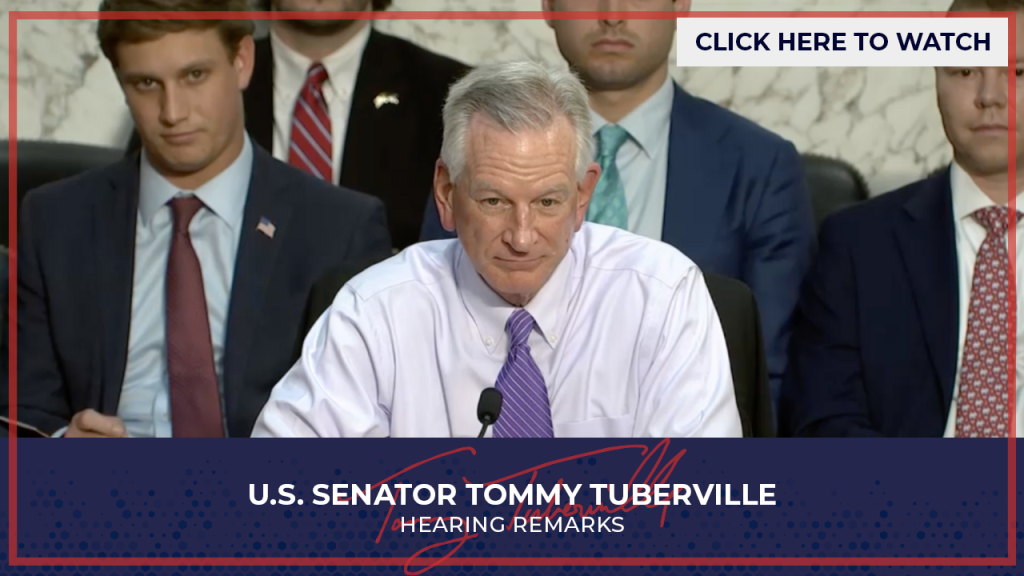WASHINGTON – Yesterday, U.S. Senator Tommy Tuberville (R-AL) spoke with Andrew Rechenberg, Economist at Coalition for a Prosperous America, and Tony Paquin, President and Chief Executive Officer at iRemedy Healthcare, Inc., during a Senate Special Committee on Aging hearing. They discussed the importance of bringing pharmaceutical manufacturing back to the United States.
Read Sen. Tuberville’s remarks below or on YouTube or Rumble.

TUBERVILLE: “Thank you, Mr. Chairman, and thanks for the panel being here today.
I’m gonna ask the obvious question, Mr. Rechenberg, do we have — if we closed our borders — do we have the ability, and the assets, and the chemicals that we could mine to make every drug that we need in this country?”
RECHENBERG: “No, not currently. And that’s why in the TRQ plan that I’m proposing, we do work with trusted countries with regulatory standards equivalent to our own. And the FDA already recognizes this through mutual recognition agreements with the European Union, the United Kingdom, and Switzerland as well. And so, we do have enough capacity when working with trusted equivalent regulatory nations like that. But currently on our own, no, we do not. And that’s why we need to rebuild this capacity.”
TUBERVILLE: “Would we have to use China?”
RECHENBERG: “No. We would not [have to use China].”
TUBERVILLE: “Okay, good. Mr. Paquin, you talk about how companies like Oxford Pharmaceuticals should be used as an example of how it is possible to own short drug manufacturing in a competitive environment.”
PAQUIN: “That’s correct, Senator. They are a very well run, significantly sized, highly-automated production facility in Birmingham, Alabama. And they really can produce pretty competitively. And I think sometimes we sort of misunderstand a little bit of the cost factor of these drugs. Amlodipine, for example, it costs about two cents a dose to manufacture, but it’s reimbursed by Medicare Part D at ten cents.
So, actually the manufacturing cost is a very small part of the total cost that ends up going to the consumer [or] to the payer. And the manufacturers like Oxford Pharmaceutical here in the United States can operate pretty competitively if they’re not a target of unfair competitive practices coming out of India.”
TUBERVILLE: “So, what changes do you think we need to make to have Oxford, and other companies, to be on a level playing field? What do we need to do?”
PAQUIN: “I think there’s really two, […] main things we can do, but there’s two immediate actions that we could be looking at. I think, Andrew and the Coalition for Prosperous America made a good recommendation about quotas [being] based on the marketplace and not allowing a country like India to overwhelm our supply—thereby driving down the value of those drugs. And secondly, is the VA and the U. S. Government should really prioritize domestic manufacturing over foreign manufacturing. And that is something that can be done without any major additional cost to the government and is not happening currently.”
TUBERVILLE: “You mentioned in your testimony that Oxford has modern FDA-approved facilities but still loses contracts to virtual importers tied to China and India. Can you explain what that says about the way our current system works?”
PAQUIN: “Well, first off, I would say it doesn’t work very well in terms of recognizing the national security implications and just the good sense of supporting a domestic manufacturer. Those contracts that they recently lost were probably a lowest price technically acceptable type of contract. And I think what’s happening there is the VA is really not applying the right way to think of technically acceptable. All generic drugs, I would argue are not equivalent, a generic drug manufactured in Birmingham, Alabama is probably going to be much higher quality and reliable than a drug made somewhere in India where we don’t have good access to surveillance of that manufacturer. So, I think that—and then also when we look at technically acceptable, we should consider resilience issues: investing in our domestic manufacturing capability should be one of the considerations when somebody like the VA is putting a contract out for bid.”
TUBERVILLE: “Thank you, Mr. Rechenberg, as we saw during COVID, [the] United States is way too reliant on China. We mentioned that, and India.
How can a well-designed tariff-rate quota system be used to strengthen domestic production and mitigate shocks or supply shortages in the U. S. market?”
RECHENBERG: “Yes, absolutely. And the main cause of the supply shortages in the market right now is disruptions to these very few sole manufacturers in China and India. We’re very much reliant on the single source vulnerabilities. But if we give the market space for U.S. producers through a tariff rate quota system, it very much encourages companies to invest in the U.S. and bring production [here], because there’s this guaranteed market space that domestic producers can capture. And so over time, it will bring back and diversify our supply base, which will lead to less shortages over time as we have more backup options and more U.S. domestic supply.”
TUBERVILLE: “Thank you.
Thank you, Mr. Chairman.”
Senator Tommy Tuberville represents Alabama in the United States Senate and is a member of the Senate Armed Services, Agriculture, Veterans’ Affairs, HELP and Aging Committees.
###